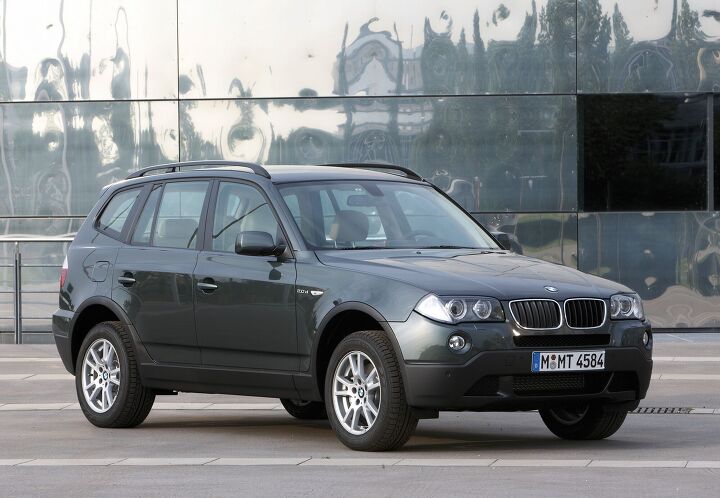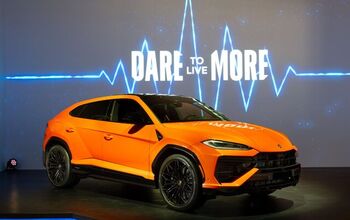BMW Accused of Emissions Cheating, Does Anyone Really Care?

Regulators in Germany have opened an investigation into alleged diesel exhaust rule circumvention on the part of BMW. Claims have been made that the automaker used an illegal defeat device on select models to achieve lower tailpipe emissions during testing. It’s a situation reminiscent of the Volkswagen Dieselgate scandal from 2015. However, government regulators have been on the offensive ever since — roping in loads of manufacturers and leaving a subset of the public wondering whether modern emission laws are even tenable.
The Kraftfahrt-Bundesamt (KBA), Germany’s federal transport authority, has alleged that BMW X3 models equipped with the brand’s 2.0-liter diesel motor contain software designed to skirt emission regulations. According to German outlet Bild, the issue stems from a difference in emissions based upon the status of the HVAC system.
Regulators are concerned that software may have been designed to intentionally emit less nitrogen oxides when the air-conditioning system is switched off. This reportedly matters because federal testing usually remains deactivated, leading to suspicion that BMW used this as a window to skirt regulations. But that seems like an oversimplification of the situation.
Due to the improved aerodynamics associated with driving with the windows up, combustion vehicles typically see improved fuel economy at highway speeds while running the air conditioner. This should also translate to lower emissions over time. However, the inverse is true at low speeds or idle because of the extra strain added by the compressor. It’s not unusual to see reduced carbon dioxide emissions when a vehicle isn’t running the A/C.
The investigation follows an earlier report issued by German environmental group Deutsche Umwelt Hilfe (DUH), which stated the BMW X3 2.0d possessed an illegal defeat device that allowed vehicles to pollute more under certain conditions. Accusations were thrown that BMW’s diesel motor saw a larger drop in emissions when the vehicle’s A/C was switched off than usual, suggesting that it could be the result of software malfeasance — comparing it to what happened with Volkswagen’s diesel vehicles years earlier.
“It is shocking that even more than seven years after the diesel scandal became known, we are detecting the highest nitrogen oxide emissions we have measured to date in diesel vehicles in real driving conditions and are finding shutdown devices in the engine control software,” DUH’s Federal Managing Director Jürgen Resch stated in German.
However, things aren’t that simple. Jürgen has been a professional environmental lobbyist since the 1980s and Deutsche Umwelt Hilfe has taken major criticisms for endorsing driving bans, carbon credits, and targeting stringent emissions laws at the expense of what’s reasonably achievable. Jürgen himself has likewise been faulted as one of the many high-profile climate activists that have utilized private jets. There’s also a lot of political tension due to how the DUH is organized — especially in regard to its ties to the government, despite claiming status as an NGO.
The organization receives funding from the American ClimateWorks Foundation, the European Commission and the German federal government as part of an EU-wide campaign to reduce pollution. It has similarly taken heat for campaigning for the advancement of diesel particulate filters in 2005 after accepting donations from the very same companies that manufacture them. It even went out of its way to endorse specific brands, calling into question how objective it truly was as an influential environmental watchdog.
DUH has likewise received funding from automakers and occasionally partnered with companies on certain programs. While several have cut ties in more recent years (e.g. Daimler and Toyota), the organization continues to receives criticism for claiming to be a non-profit.
Still, the above doesn’t automatically mean the group hasn’t uncovered emissions cheating on the part of BMW. Its investigation into Volkswagen Group helped uncover software manipulation that had the vehicle’s running lean spending on wheel positioning (indicating that it was operating on a test rig). So there’s reason to believe it might have uncovered similar shenanigans here.
But it also played a role in killing demand for affordable diesel vehicles in both Europe and the United States. No matter how you slice it, Deutsche Umwelt Hilfe seems hellbent on ending diesel-based transportation and it’s difficult to overstate just how much influence it has over German regulators and the industry at large.
While BMW won’t say much about the current investigation, it did end 2023 stating it’s in contact with European authorities to clarify questions made about emissions following concerns about a specific BMW model produced between 2010 and 2014. Odds are good it was talking about the X3 with the 2.0-liter diesel.
BMW CEO Harald Krueger also previously said that the company had not manipulated any diesel engines following the initial allegations — perhaps hinting at its stance should any formal charges be pressed.
But your author is wondering whether or not anyone even cares at this point. Volkswagen was fined billions of dollars and the United States forced it into establishing a subsidiary to improve the national EV charging infrastructure. The company is known as Electrify America and it has consistently been the worst-ranked charging network in the country. VW has also struggled to effectively launch EVs as it pivoted toward electrification, despite remaining broadly profitable.
For all the effort put into emissions regulations, they arguably haven’t resulted in better automobiles. Consumer satisfaction surveys have been trending downward while prices continue to climb. Meanwhile, regulatory efforts seem focused on determining what type of vehicle you’ll be allowed to drive in the future and using regulatory fines to further shape the industry by pouring the money back into businesses that are ideologically aligned with the relevant NGOs.
Similar arguments can certainly be made about the oil industry. But it also appears to have bought into using environmentalism as a shield. Its lobbying efforts are also a little more blatant and the entities shilling for it don’t appear to have the government’s ear like they used to. The real issue is likely not which group is trying to influence policy but rather the fact that it’s happening on a corporate and/or political level. At the end of the day, too much of this just feels like a colossal waste of time and money without any noteworthy advantages trickling down to the consumer.
[Image: BMW]
Become a TTAC insider. Get the latest news, features, TTAC takes, and everything else that gets to the truth about cars first by subscribing to our newsletter.

A staunch consumer advocate tracking industry trends and regulation. Before joining TTAC, Matt spent a decade working for marketing and research firms based in NYC. Clients included several of the world’s largest automakers, global tire brands, and aftermarket part suppliers. Dissatisfied with the corporate world and resentful of having to wear suits everyday, he pivoted to writing about cars. Since then, that man has become an ardent supporter of the right-to-repair movement, been interviewed on the auto industry by national radio broadcasts, driven more rental cars than anyone ever should, participated in amateur rallying events, and received the requisite minimum training as sanctioned by the SCCA. Handy with a wrench, Matt grew up surrounded by Detroit auto workers and managed to get a pizza delivery job before he was legally eligible. He later found himself driving box trucks through Manhattan, guaranteeing future sympathy for actual truckers. He continues to conduct research pertaining to the automotive sector as an independent contractor and has since moved back to his native Michigan, closer to where the cars are born. A contrarian, Matt claims to prefer understeer — stating that front and all-wheel drive vehicles cater best to his driving style.
More by Matt Posky
Latest Car Reviews
Read moreLatest Product Reviews
Read moreRecent Comments
- Nrd515 GM: If you are going to revive the Camaro again, PLEASE do the following:[list=1][*]Make it actually good looking, and avoid the first gen "tribute" disaster of the last 14 years. You managed to take the pretty ugly 2010 to 2106 cars and then make them even uglier for the last years. And you wondered why it didn't sell? Look at the back of the car and you really think that's a good look?[/*][*]Make the car's trunk actually useful for more than golf clubs. [/*][*]Make it slightly larger inside, the last two gens have been almost like being in a small cave. The interior was hideous, too. Boring is fine, as long as it's in black.[/*][/list=1]I am a 2 time Camaro owner ('79 and '86), and a one time Trans Am ('79) owner. Instead of a Camaro, I have owned 2 Challengers.
- Nrd515 When my '18 Torred Challenger was stolen back in Feb, I never expected to get it back in any kind of decent shape and had negotiated a deal to buy a '23 Scat Pack in Plum Crazy Purple. I almost bought my '18 in that color, but I worried I would get tired of it. I see a PCP Challenger all the time and like it, and the PCP car was equipped exactly as my present car is, so it was an easy choice. My car was found minutes after I had finished the negotiation, and 2 months later, about $2000 out of pocket, and the insurance paying about $12K in repairs, the car is back and is now a huge hassle to steal with a wheel lock, neutral release blocking plate, Carlock, and a Fast 5.0 throttle lock out. No cell phone with the correct code, all it does is idle.
- Nrd515 I have an '18 Challenger too, use my trunk daily, and just like my '10 Challenger, and my '08 Charger, the factory struts soon weakened to the point I got conked on the head when it was under 50 degrees outside. You can't hold the trunk open and pick up a heavy or awkwardly shaped object, so getting nailed was a constant threat. I bought new factory struts for the two older cars, and within a year was getting conked or coming close to getting conked. I finally bought a set of enhanced power struts and I wish I had done it back about 2010 when my Charger "got me" the first time. I've had them for over 19 months and they still are stronger then the factory ones. Once the lid is up, it stays up, even at about 0 degrees F.
- BobinPgh Bozi I have seen pit stops and it seems you have to be more of an athlete than a mechanic. So I am surprised that you got into from writing. Did you play a sport in school? Do you work out at the gym? Are you starting to get "too old" for this? Just going over the wall you have to be a young man. Do you have to stay away from the sweets and the fat?
- Tassos View it another way, if the car buying pubic had an average age of 6 or 8 years old (in HUMAN years!), these finned creatures would be a smash hit. Even I liked the horizontal fins (that looked more like narrow squinted eyes than fins) on some 60s Impalas. When I was SIX, not now!


































Comments
Join the conversation
I totally care. So there!
The new on-the-road tests mandated by the EU do result in noteworthy advantages in nitrogen emissions.
This is how automakers tied themselves up in a knot: they cheated in emissions before, which led to more stringent regulation by lawmakers after air quality in cities failed to improve, and now automakers have to actually hit those more stringent targets in real-world conditions.